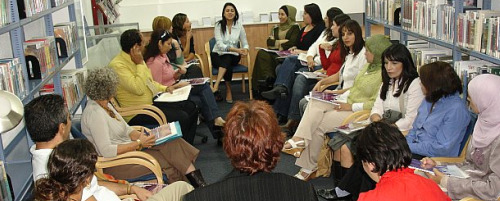The Merchavim Institute works to educate Israeli society by training Arab and Jewish teachers to pass on to their students a sensitivity to diversity.

Like every democracy growing into the 21st century, Israel has challenges to face. In the 1960s, the American civil rights movement changed the face of education and opportunities for black Americans. Israel, the only democracy in the Middle East, has similar challenges but the context is different.
While concerned that Israeli communities could become fragmented into Balkan-like states, Mike Prashker is optimistic that the work of the Merchavim Institute, of which he is executive director, will help the various members of Israel’s diverse society live together democratically, enjoying both each other’s uniqueness and commonality, without compromising their own heritage or identity.
Merchavim was established in 1998 to “dignify the diversity” of Israeli citizens. It employs a 20-person team from all walks of life to help educate and employ Israel’s extremely complex cultural and racial milieu.
The country’s population is a mix of religious and secular Jews, Muslims and Christians, with an enormous immigrant population from the Jewish Diaspora trying to fit into the story. And despite the fact that one in five Israelis is an Arab and the two populations live side by side in cities like Jaffa, Acre and Haifa, there is only basic interaction between most Israeli Arabs and Jews.
The Merchavim Institute (merchavim is Hebrew for “spaces”) provides training for Israeli teachers in how to incorporate sensitivity to this cultural diversity into their work in the classroom. The jewel in its crown is a program that trains and places Arab teachers in Israeli Jewish schools, something which previously was virtually unheard of.
The context is conflict
Comparing Israel to the US, Prashker tells ISRAEL21c: “Obviously one has to be cautious about drawing historical comparisons. If you look at Israel and the US or any democracy, we are on parallel and shared journeys to provide greater access and more opportunities for citizens of diverse backgrounds.
“Played out dramatically in the US in the civil rights movement, it is an ongoing journey. Schools are still disproportionately white, black and separated among socio-economic issues,” continues Prashker, recognizing that Israeli schools share a common challenge with four school systems, which while not segregating students, separate them according to nationality and religious observance.
However, educators in Israel face a different reality, according to Prashker. “In Israel, we are challenged in the context of conflict. People are scared not only for racist reasons or imaginary reasons, but because there really is a conflict,” he explains.
Immigrating to Israel in 1978 from the UK, Prashker worked first as a political science teacher at universities, and then in pluralistic Jewish education for the next 10 years. He believes it’s important for the Jewish people to have a homeland, a state and citizens, and that society building requires “strong engagement.”
Aware of the limitations of Israel’s four separate school systems, and even of other NGOs working to connect Israelis, he seeks to go beyond the simplistic issues of diversity – Jewish versus Muslim, religious versus secular, for example – to build something else: “A win-win that dignifies our diversity, increases opportunities for all and gets beyond zero sum worldviews,” he says.
“Society-building is not just about secular and religious or new immigrants getting comfortable with those who are different from them,” Prashker explains. “Once you get the hang of being more comfortable in diversity, this works toward other communities: Lesbians, the physically challenged. Really, in that sense the fundamental challenge facing Israel is the same fundamental challenge facing North America,” he says.
To live and prosper together
While it’s not illegal for Arab youngsters to study in a Jewish school, social and structural barriers maintain a strong separation, but Prashker believes this can change. “When I look at the North American experience and the harsh realities of segregation and the civil rights movement, I am extremely encouraged. The prospects of society-building are considerable and bright,” he contends.
“We have to believe our young citizens can and will be equipped to live, study and prosper together. We have to believe that,” Prashker admonishes, adding that with a “healthy skepticism of the government” Merchavim attempts to teach diversity in diverse ways.
Each year, hundreds of teachers from kindergarten to high school are equipped with educational resources to help their students become more familiar with the different groups that comprise Israeli society.
In cooperation with the Ministry of Education, Merchavim also runs a major program in religious high schools that engages the students with the challenges of a society of diverse citizens from a Jewish source-based perspective.
Championing efforts to create a new reality, Prashker has little patience for those whom he believes are fond of mudslinging and are unfairly critical of Israel, who claim that the Jewish people are less entitled to a national homeland. However, he concludes, “I am equally impatient of people not prepared to see the less-than-perfect reality and inevitable blemishes that every society and every democracy face. Israel is not a better society by us denying that we are far from providing equal opportunities for all.”












